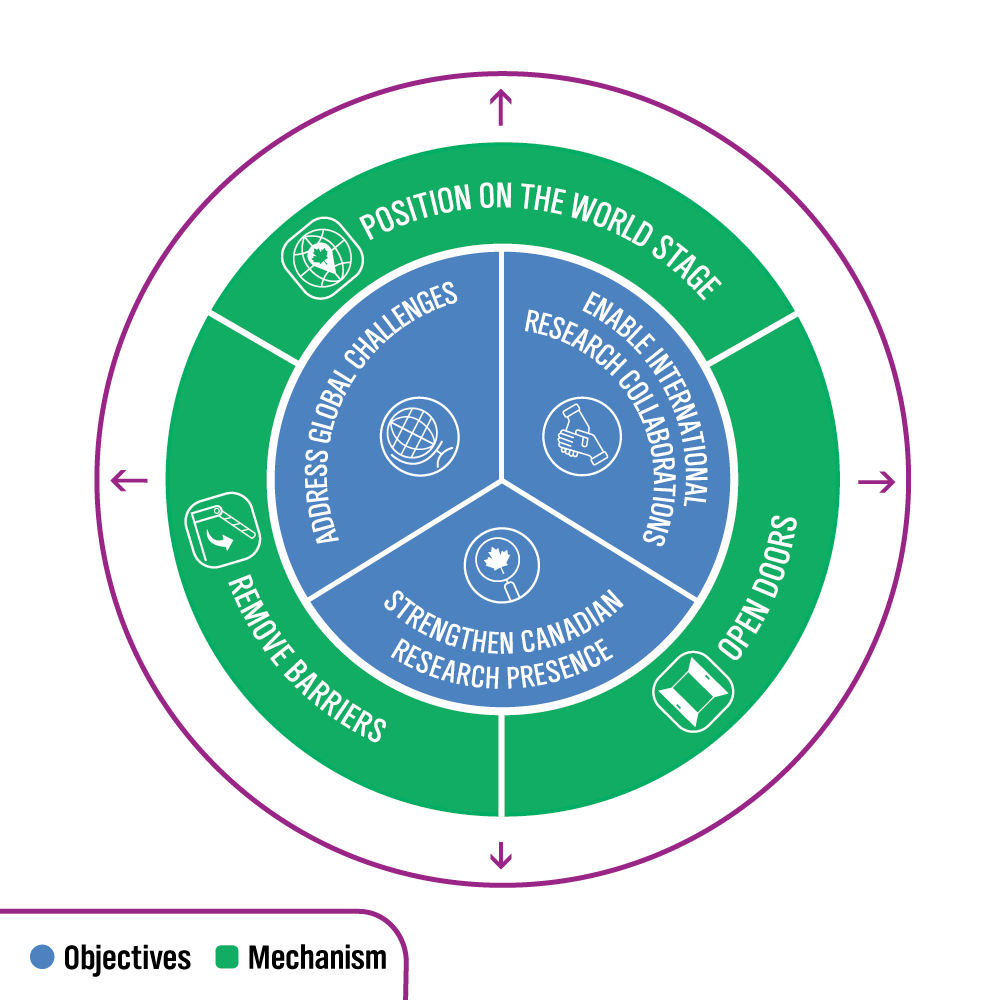SSHRC’s International Framework
Research, by its very nature, is collaborative and transcends boundaries and borders. Funding agencies around the world are investing to develop, support and sustain international research collaboration as a way of strengthening domestic research excellence and tackling pressing global challenges.
The Social Sciences and Humanities Research Council (SSHRC) is committed to strengthening international research collaboration within the Canadian research enterprise, for the benefit of Canada and the world. SSHRC’s international framework sets out clear objectives, mechanisms, and directions to guide the agency’s ongoing and future international activities.

SSHRC’s international objectives
1. Enable Canadian researchers to participate in global research collaborations:
- work with highly qualified international researchers
- facilitate access to world-class research talent, ideas, resources and infrastructure
- attract top-tier research talent to Canada
2. Support Canadian researchers in addressing complex, global challenges:
- contribute Canadian knowledge, expertise and insights to finding solutions to humanity’s most pressing problems
- advance fundamental knowledge and insights about society, culture and the human experience
3. Strengthen the Canadian research community’s international presence and visibility:
- bring Canadian social science and humanities and interdisciplinary perspectives to international research policy forums
- ensure Canadian research policy is aligned with emerging standards
- advance Canada’s foreign policy priorities through science diplomacy
- build confidence in Canada as a preferred and trusted international research partner
These goals are aligned with those of the Canada Research Coordinating Committee’s International Framework. SSHRC works closely with the Natural Sciences and Engineering Research Council, the Canadian Institutes for Health Research and the Canada Foundation for Innovation, as well as other key research funders, to ensure a strong and coherent Canadian research enterprise.
Three mechanisms to achieve SSHRC’s objectives
SSHRC supports international research collaboration and multilateral engagement through three main mechanisms:
1. Remove barriers to international collaboration
For most of SSHRC’s core funding opportunities, internationally based researchers at postsecondary institutions are eligible to receive funding as co-applicants. SSHRC promotes student and postdoctoral researcher mobility in the social sciences and humanities by enabling them to take scholarships and awards abroad, strengthening the potential for collaboration between Canadian universities and those outside of Canada. SSHRC also attracts some of the world's most accomplished and promising minds to build research excellence.
2. Open doors through international joint initiatives
Over the past decade, SSHRC has been engaged in several international bilateral and multilateral joint initiatives, testing various models of collaboration. As a small organization, SSHRC is committed to ensuring such investments are strategic and effective. These initiatives provide opportunities for collaboration that contribute to Canadian knowledge, leverage international expertise and talent, and ensure Canada is strongly linked to research and researchers across the globe.
3. Position Canadian social sciences and humanities and interdisciplinary research on the world stage
SSHRC undertakes several international activities that help raise the profile of Canadian research and researchers around the world. These help shape the global research ecosystem, and contribute knowledge and expertise to address global challenges. For example, SSHRC advances Canada’s foreign policy priorities through science diplomacy, and brings Canadian perspectives to international research policy forums. The agency works to ensure Canadian researchers are sought out to participate in international initiatives, for instance by nominating leading Canadian social sciences and humanities researchers to international scientific/scholarly bodies.
Strategic directions
SSHRC has identified a set of strategic directions that will focus efforts to advance the agency’s international objectives for the current period:
- Multilateral and bilateral collaborations: Continue to invest in the long-term sustainability of the Trans-Atlantic Platform as SSHRC’s primary, multilateral mode to support international collaboration. SSHRC will also evaluate emerging opportunities (bilateral or multilateral, investigator-driven or mission-driven) that will bring specific, distinct, strategic benefits aligned with Canada’s broader foreign or trade policy, prioritizing partners based on their research and innovation capabilities, and ensuring a diversity of international collaborations, in high-income countries as well as lower- and middle-income countries.
- Interdisciplinary research: Continue to engage with the other agencies and the Canada Research Coordinating Committee to pursue new interdisciplinary, challenge-focused international joint initiatives, ensuring that calls reflect an inclusive approach and provide sufficient opportunity for social sciences and humanities research.
- Indigenous research leadership across borders: Promote and support Indigenous leadership in research, and Indigenous researchers and organizations in international collaborations.
- Research training: Advance opportunities for students and postdoctoral researchers to gain international research training experience, through strategic partnerships as well as strengthening supports for international mobility.
- Francophonie: Explore ways to support international research collaboration in French, and strengthen engagement with international funders from the Francophonie.
- Policy alignment: Monitor evolving international research funding practices and explore broader Government of Canada strategies.
- Science diplomacy: Strengthen SSHRC’s participation in international forums for research.





